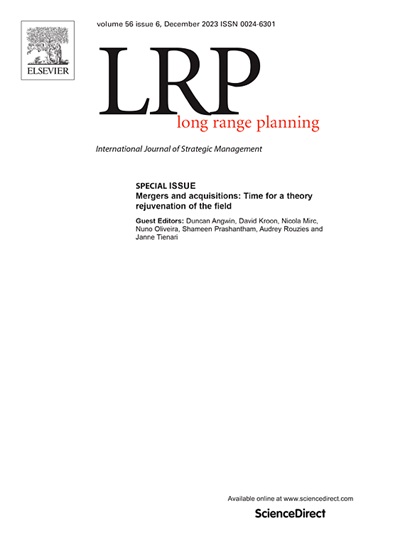Sourcing smart through project manager structures: The role of managerial direction multiplicity in Korean popular music industry
IF 6.3
2区 管理学
Q1 BUSINESS
引用次数: 0
Abstract
Internal development project organizations are likely to have a pre-defined internal goal to optimize the use of internal resources while joint development project organizations tend to have a flexible goal to take advantage of diverse external resources. In this situation, the managerial direction multiplicity of project managers (i.e., convergent or multi-faceted directions) reflected in their organizational structures can affect the effectiveness of sourcing strategy differently. Three key structural components of project managers—project manager group size, prior interactions among project managers, and managerial authority split—were chosen to examine their impact on project market performance by two sourcing strategies. Empirical evidence from the Korean popular music (K-Pop) industry for the period 2004–2013 at the album project-level supports that project manager structures offering multi-faceted directions improve project market performance more for joint development projects, while those offering convergent directions improve performance more for internal development projects. This study highlights the importance of project manager structures in sourcing strategies by theorizing managerial direction multiplicity as a key mechanism.
通过项目经理结构聪明地采购:管理方向多元化在韩国流行音乐产业中的作用
内部开发项目组织可能有一个预先定义的内部目标,以优化内部资源的使用,而联合开发项目组织往往有一个灵活的目标,以利用多样化的外部资源。在这种情况下,项目经理在其组织结构中所反映的管理方向多样性(即趋同方向或多面方向)会对采购策略的有效性产生不同的影响。选择了项目经理的三个关键结构组成部分——项目经理团队规模、项目经理之间的先前互动和管理权力分割——通过两种采购策略来检查它们对项目市场绩效的影响。来自2004-2013年韩国流行音乐(K-Pop)行业专辑项目层面的经验证据支持,对于联合开发项目,提供多方面方向的项目经理结构更能提高项目的市场绩效,而对于内部开发项目,提供聚合方向的项目经理结构更能提高项目的绩效。本研究通过将管理方向多元性理论化为关键机制,强调了项目经理结构在采购策略中的重要性。
本文章由计算机程序翻译,如有差异,请以英文原文为准。
求助全文
约1分钟内获得全文
求助全文
来源期刊

Long Range Planning
Multiple-
CiteScore
13.00
自引率
7.10%
发文量
75
期刊介绍:
Long Range Planning (LRP) is an internationally renowned journal specializing in the field of strategic management. Since its establishment in 1968, the journal has consistently published original research, garnering a strong reputation among academics. LRP actively encourages the submission of articles that involve empirical research and theoretical perspectives, including studies that provide critical assessments and analysis of the current state of knowledge in crucial strategic areas. The primary user base of LRP primarily comprises individuals from academic backgrounds, with the journal playing a dual role within this community. Firstly, it serves as a platform for the dissemination of research findings among academic researchers. Secondly, it serves as a channel for the transmission of ideas that can be effectively utilized in educational settings. The articles published in LRP cater to a diverse audience, including practicing managers and students in professional programs. While some articles may focus on practical applications, others may primarily target academic researchers. LRP adopts an inclusive approach to empirical research, accepting studies that draw on various methodologies such as primary survey data, archival data, case studies, and recognized approaches to data collection.
 求助内容:
求助内容: 应助结果提醒方式:
应助结果提醒方式:


